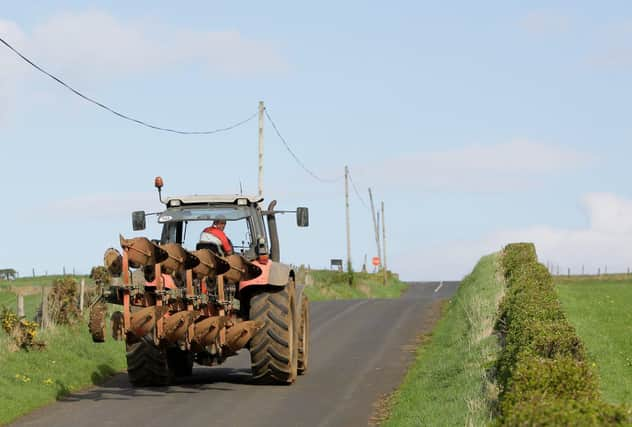Rules of the road reminder


Licensing
A 13 year old is allowed to drive a tractor on private farmland, but not on the road. By law, children between 13 and 15 years old wishing to drive a tractor for agricultural purposes on private land must successfully complete a LANTRA Awards certified course. This is enforced by The Agriculture (Safety of Children and Young Persons) Regulation (Northern Ireland) 2006 and the Approved Code of Practice (ACoP). Tractors must be fitted with an enclosed, approved safety cab. The training provided allows them to drive tractors only, not other agricultural vehicles.
A 16 year old may obtain a provisional category F licence which allows them to drive tractors up to 2.45m wide and tow a trailer up to 2.45m wide on public roads for agricultural purposes only. The restrictions are based solely on width. The weight is also restricted by the 2.45m wide limit. They are not allowed to drive in 30mph zones unless they pass a category F test.
Advertisement
Advertisement
At 17 years old, a category B licence (car licence) can be obtained. The 2.45m width restriction no longer applies and the individual can drive through 30mph zones. Category B licence holders must not exceed the maximum laden weight of trailer/ towed appliance which is 18.29t or the maximum combination weight of a tractor and laden trailer/towed appliance which is 31t.
Under special licensing arrangements, farmers are allowed to drive larger vehicles on their farm, such as telehandlers and self-propelled machines without holding a large goods vehicle (LGV) driving licence entitlement. However, the driver must be at least 18 years of age to drive a vehicle weighing between 3.5 and 7.5t (category C1 licence), and 21 years of age to drive a vehicle over 7.5t (category C licence).
ATVs (quads) and gators on public roads
Anyone driving a quad or gator on public roads must have a driving licence, third party insurance, number plates, vehicle tax, lights, reflectors and a helmet. It’s an offence to drive a motorised vehicle, such as a quad or gator on a public road without any of the stated requirements.
The minimum driving licence that allows you to drive a quad on a public road is a category AM licence. This allows a driver to drive a four-wheeled vehicle with an unladen weight of no more than 350kg, (not including the mass of the batteries in the case of electric vehicles), with a design speed between 25 km/h and 45 km/h.
Advertisement
Advertisement
A category AM licence can be obtained at age 16. Learner riders of category AM must complete Compulsory Basic Training (CBT) before riding unaccompanied on public roads. A full category B licence which is obtained at 17 years is required to drive a quad / gator that weighs more than 350kg, which would be typical of most quads on farms in Northern Ireland.
Red diesel
The government announced at the 2020 budget, that it was removing the entitlement to use red diesel from most sectors, except for agriculture (as well as horticulture, forestry and fish farming), rail and non-commercial heating, from 1 April 2022. Agriculture will retain its right to use red diesel for activities directly related to farming, including cutting verges and hedges, snow and flooding clearance and gritting roads. For farmers using and obtaining red diesel will remain as is.
Indirectly farmers will be impacted. For businesses that do not retain the right to use red diesel, such as the construction industry, there will be a significant increase in costs which agriculture and other the wider economy will be impacted by. Businesses that lose the right to use red diesel must ensure they run down their existing stocks before 1 April 2022. There will be no grace period to use up ‘old stocks’ after this point. The government has also suggested that when a business switches from storing red to white diesel, it will need to flush out the tank and supply lines until no trace of marked rebated fuel remains by 1 April 2022.
Penalties for breaking restrictions on the use of rebated fuels will also change, allowing HMRC to seize vehicles and other machinery in certain circumstances.